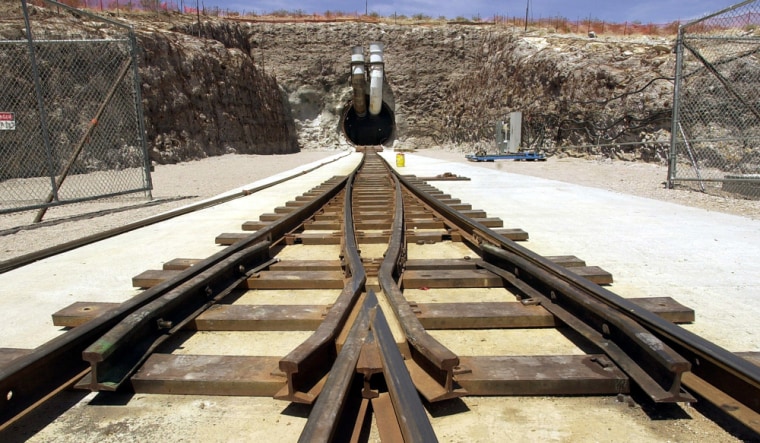Driving a last nail into a $13.5 billion coffin, Energy Secretary Steven Chu said Thursday that the nearly completed Yucca Mountain site in Nevada is no longer an option for storing highly radioactive nuclear waste.
Instead, Chu said, the Obama administration believes the nearly 60,000 tons of waste in the form of used reactor fuel can remain at nuclear power plants while a new, comprehensive plan for waste disposal is developed.
Chu's remarks touched off a sometimes testy exchange with Sen. John McCain, R-Ariz., President Barack Obama's rival for the White House last year, and provided the most definitive signal yet that the government's attempt to address the commercial nuclear waste problem is veering in a dramatically new direction.
At a hearing, McCain and Sen. Lisa Murkowski, R-Alaska, said the decision not to pursue the Yucca Mountain project threatens the expansion of nuclear energy because the government can give no assurance on waste disposal.
For 22 years, a ridgeline of volcanic rock 90 miles northwest of Las Vegas has been the focus of the government's plans to build an underground repository for high-level reactor waste. To date about $13.5 billion has been spent on the project and last year the Bush administration submitted an application for a construction and operating license to the Nuclear Regulatory Commission.
'New strategy' promised
But Obama's first budget a week ago proposes scrapping all spending on Yucca Mountain except for what is needed to answer questions from the NRC on the license application "while the administration devises a new strategy toward nuclear waste disposal."
"What's wrong with Yucca Mountain, Mr. Chu," McCain asked at an Energy and Natural Resources Committee hearing on support for scientific research.
"I think we can do a better job," replied the Nobel Prize-wining physicist.
McCain asked whether it was true that Obama — as well as Chu — view Yucca Mountain as no longer an option.
"That's true," replied Chu.
"Now we're going to have spent fuel sitting around in pools all over America," shot back McCain, who characterized the Obama position on nuclear waste — and its rejection of waste reprocessing — as a reflection of the administration's opposition to nuclear energy.
Chu said there were short-term answers other than Yucca, while a long-term solution to dealing with nuclear waste is developed.
"The interim storage of waste (at reactors), the solidification of waste, is something we can do today. The NRC has said we can do it safely," said Chu.
2,000 more tons each year
The federal government is obligated by law to accept the used reactor fuel from 104 commercial power reactors, but as yet it has no place to put it. The spent fuel, growing at the rate of 2,000 tons a year, now is being held in pools and above-ground concrete containers at reactor sites.
There appear to be no immediate plans by the Energy Department to withdraw the Yucca Mountain license application before the NRC because to do so could trigger lawsuits from the nuclear industry. The NRC has up to four years to consider the application.
In 1987, Congress directed that only Yucca Mountain be evaluated as a future central government repository for the waste.
A report to Congress in December by the Bush administration — which strongly supported the Yucca Mountain project — dismissed suggestions that reactor waste be kept at temporary storage sites by the government. That would require Congress to change the 1982 law, the report said.
More on the Yucca nuclear waste controversy
